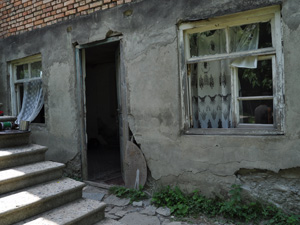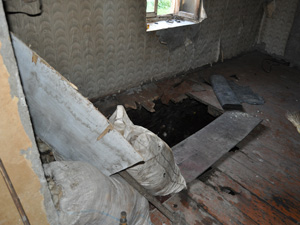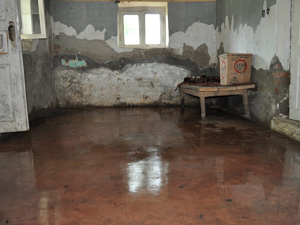Gela Mtivlishvili, Kakheti
 “The landslide destroyed my house in the mountainous Adjara region. Here, they settled us in destroyed houses 700 kilometers away from my village. I remember they brought us at night and we could not see anything; there was no electricity. They promised us to shelter into houses with modern reconstruction but my house does not have even a floor; the walls are pulling down. Two days ago the floor broke down and I fell into the basement with my bed; I hardly survived,” said eco-migrant Zhuzhuna Gogitidze who lives in the village of Koreti in Akhmeta district.
“The landslide destroyed my house in the mountainous Adjara region. Here, they settled us in destroyed houses 700 kilometers away from my village. I remember they brought us at night and we could not see anything; there was no electricity. They promised us to shelter into houses with modern reconstruction but my house does not have even a floor; the walls are pulling down. Two days ago the floor broke down and I fell into the basement with my bed; I hardly survived,” said eco-migrant Zhuzhuna Gogitidze who lives in the village of Koreti in Akhmeta district.
32 families from Khulo and Shuakhevi district were settled in Koreti village in 2003-2005. 10 families have already abandoned Koreti and returned back to Adjara where their lives are in danger because of landslide threat.
The main reason for the eco-migrants to flee from the village is lack of school in
 the village. “I have four children and they go to school in the village of Sakobiano which is 4 kilometers away from here. In rainy days children cannot go to school. When Alazani River floods, it is impossible to cross the bridge. Our several neighbors have sent children to Adjara and they go to school there. Several families have returned to Khulo district for that reason. I am also going to return there,” said Rezo Mamuladze.
the village. “I have four children and they go to school in the village of Sakobiano which is 4 kilometers away from here. In rainy days children cannot go to school. When Alazani River floods, it is impossible to cross the bridge. Our several neighbors have sent children to Adjara and they go to school there. Several families have returned to Khulo district for that reason. I am also going to return there,” said Rezo Mamuladze.
We met 16-year-old Tea Diasamadze near the stream. “I cannot go to school alone. There are farms on the way and farmers have dogs. I leave home at 7:30 am in the morning and it takes me more than 1 hour to get to school,” said Tea.
The public school was closed in Koreti village in 2000. The former building has neither floor nor windows or doors. The walls are also pulling down; the bricks fell off from the walls. The nursery school does not work either. The primary school is functioning in the former building of the nursery school where only 8 children learn. There are 2 classrooms and one teachers’ room in the building.
There is no out-patient’s in the village. The only building which was constructed recently in the village was Orthodox Church.
Eco-migrants living in Koreti village have other important problems too. “There are plenty of problems in the village; the road was badly damaged but they graveled it before recent elections. I come from Shuakhevi district. We settled here in 2005. They gave me the house which is already pulling down. I cannot repair it because it is not registered on me. When they settled us here, the authority promised us to register the houses in 3 years. 5 years have passed but they have not done it yet,” said Aleksandre Zoidze who was fishing in Alazani River. “We do not have food for dinner and I came here to fish.”
Eco-migrants look after cattle in the village. Only several families have plots.
Eco-migrants living in the village of Areshperani in Lagodekhi district also urge for help. The houses assigned to them by the Ministry of Refugees and Accommodation are damaged and dangerous for life because they can pull down any time.
Manana Kaladze was settled in Areshperani from Vani district in 2009. The ministry
 of refugees and accommodation sheltered them in a damaged house. “The roof is destroyed. In rainy weather, the rain is leaking into the house. The walls are cracked and pulling down. In windy weather we shelter our neighbors because we are afraid the house will pull down. I cannot repair the house. We hardly keep the family,” said Manana Kaladze.
of refugees and accommodation sheltered them in a damaged house. “The roof is destroyed. In rainy weather, the rain is leaking into the house. The walls are cracked and pulling down. In windy weather we shelter our neighbors because we are afraid the house will pull down. I cannot repair the house. We hardly keep the family,” said Manana Kaladze.
Eter Surmanidze has lived in Areshperani for one year already. Her family is from the village of Agara in Khulo district. The ministry of refugees and accommodation settled 83 more people together with the Surmanidzes in Areshperani. The houses were distributed based on ballot. “When it rains, I sit with umbrellas in the house. If it does not rain, there is water on the ground floor. The house is very damp and we cannot dry it. The walls are pulling down. We applied to the Lagodekhi district administration several times. I wrote petitions but nobody paid attentions to us. Other people also applied to the district administration but they were not replied either,” said Eter Surmanidze.
Nowadays, 105 eco-migrant families live in Areshperani; 80 % of them live in extreme poverty.
Lagodekhi district governor Dimitri Loladze said only one eco-migrant family applied to them for help. “The commission discussed his problem and we will assist them as we can. We have not assigned those houses to them and they should apply to the ministry which sheltered them there. I do not know how eco-migrants live and I cannot say anything,” said the district governor.
Despite many attempts, the ministry of refugees and accommodation did not comment on the problem of the eco-migrants.
News
December 13, 2023
Ethnic minorities outside the peace dialogue
November 6, 2023
‘Peace’ agenda of political parties
Popular
Articles
February 13, 2024



